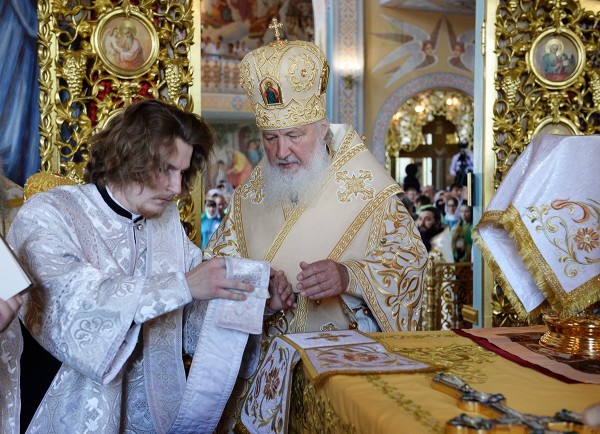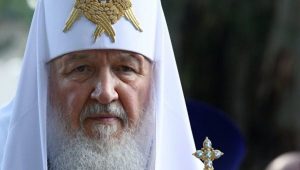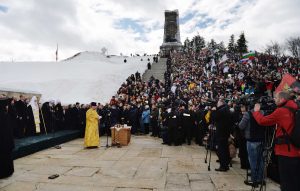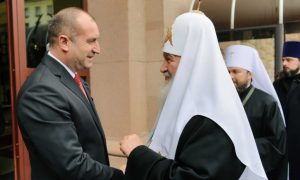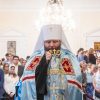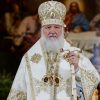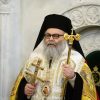Your Eminence, Vladyka Metropolitan Barnabas! Your Excellency, Head of Chuvashia! Your Eminences and Graces! Honorable leading representatives of the public authorities! Fathers, Brothers, and Sisters!
I heartily congratulate you on this Sunday, and rejoice that the Lord has brought me to the pious land of Chuvashia in order to pray here with all of you in this new church dedicated to Prince Vladimir, the 1000th anniversary of whose repose we are celebrating this year.
This Sunday coincides with a great feast day, one that is greatly venerated by our people: the memory of the Prophet of God, Elias. One might wonder: what do Cheboksary and Israel of nearly one thousand years before the Nativity of Christ, when the Prophet Elias lived, have in common? What a great distance of time divides us: three thousand years; and the Prophet lived in a place geographically situated far from the place we are now. But we venerate the name of this Prophet of God, for it has not been erased from history. This is actually highly uncommon, for history has preserved very few names from such deep antiquity. Moreover, no one would ever think of gathering together in memory of some ancient hero to stand for almost three hours to turn his thoughts to him. Nothing of the kind takes place anywhere except in the Church, for it is the Church that preserves the memory of those who have most greatly contributed to the life of human society.
Today we glorify the name of the Prophet of God, Elias. In his honor we chant hymns, we deliver sermons, and we direct our thoughts to his labors. Elias was a Prophet, that is, a man who received from God a special gift and special powers. Some people believe that a Prophet is one who sees and predicts the future, but that is not correct. Certainly, a Prophet might have the power of spiritual vision and of foreseeing the future, but the meaning of the prophetic mission is different. A Prophet is he who communicates to people God’s truth and God’s will. A Prophet receives from God a signal of such strength that it cannot be compared to any natural influence on the human psyche. It is not simply a suggestion, but rather a Divine imperative. A Prophet devotes his entire self to communicating to other people the words he has received from God and the thoughts that have come to him from above.
The Prophet Elias was just such an inspired witness of God’s truth and God’s will, and he lived during a very difficult time. King Ahab, who ruled at the time of Elias, was weak-willed. His wife, Jezebel, was a Phoenician by nationality and a woman of strong character. She married the King of Israel, but did not abandon the pagan cults, venerating Baal and Astarte. Having become Queen, she decided to promote her faith in these false idols among the entire people of Israel. Her husband also submitted to her will, doing everything she told him to do. Pagan temples in honor of Baal and sacred groves in honor of Astarte began to appear in the country. When the Prophet Elias began to preach, there were 450 false prophets of Baal in Israel. They were responsible for changing the minds of the Israelites and turning them against veneration of the true God. With the support of the King’s power, the servants of Baal started to promote this falsehood. A lie that is promoted with the support of the public authorities is accepted at least out of fear: a mass betrayal began and many people renounced God…
What did Elias do? He was one against 450 who had the support of the government and the kingly treasury. How could he manage to shout down these 450 voices, along with Queen Jezebel and Ahab, the King of Israel? The Prophet of God turned in great prayer to the Lord and God, by his prayers, punished the people of Israel: there was no rain for over three years. Finally, the culmination of this battle was reached when the brave Elias told Ahab: “Build an altar at Mount Carmel and let your false prophets offer sacrifice to Baal without lighting a fire.” The altar was made, the firewood was laid upon it, and a sacrificial animal was placed thereupon. However, no matter how hard the false prophets tried, they could not summon fire from the skies; nothing happened. Then Elias offered fervent prayer to God, and the flame lit and the sacrifice was offered to the One True God. That day the rain came down (cf. 3 Kings 18:1-46). Thus one man, relying on the power of God, defeated the entire state authorities and all the strength of that false and sinful ideology, and saved his people. Thus, today we all remember this ascetic struggler of the Old Testament.
When the Lord Jesus Christ came into this world, He also acted as a Prophet. He revealed God’s will and God’s truth to people. People called Him a Prophet until they realized that He was the Son of God. And we know that God’s truth appeared incompatible with the convictions of the Judaic rulers of that time and with the minds of the majority of the people. The Lord was nailed to the Cross for that truth. After His Resurrection, He sent the Apostles to preach even “unto the uttermost part of the earth” (Acts 1:8). He sent them into the world that they might continue His prophetic ministry, and today the Church has been entrusted with that ministry: it is called upon to speak the truth of God to people.
Just as in the ancient world, these words are not easily accepted by the world, because truth stings the eyes, the truth burns, the truth wakes up pangs of conscience, the truth does not allow one to live peacefully, and it compels one to think about serious matters. God’s truth is a challenge to every person, a challenge to society, peoples, and governments. That is why the Church has been persecuted throughout its entire history. It is enough to recall a seemingly very prosperous time: Byzantium in the fifth century. At the head of the Church of Constantinople was Archbishop John, who received the designation “Chrysostom” and was a great preacher and a holy man. He declaimed against the Emperor and his wife, whom he compared to Jezebel. But then what? The Orthodox Emperor of the most Orthodox Empire threw the unfortunate Archbishop John Chrysostom into prison, who was then exiled to Abkhazia, where he died of malaria and hunger.
What does this all teach us? The story of the Prophet Elias, the prophetic ministry of the Lord Jesus Christ, and the prophetic ministry of the Church teach us that prophecy is a ministry connected with risk. At some point, anyone who finds the courage to speak the truth to the world becomes an outcast. We see what is happening in the world today, when many governments apply laws that legalize debauchery, the most dreadful sinful actions that were punished by fire and brimstone from Heaven in the Old Testament. When the Church raises its voice against this, it is pounced upon with penalties. But such is the ministry of the Church.
In our country, we are living in a very happy period. There has perhaps never been another time throughout the entire history of Russia when the government has treated the Church in such a respectful manner without interfering in its internal affairs. In its turn, the Church, without interfering in government affairs, has the right to determine its position on many vitally important issues. We should thank the Lord that, after such horrible persecution, He has allowed us this spiritual respite, when we can build churches, schools, and bring up the youth. But by no means should this happy period lull us. We should remember that many things have taken place throughout history. And every priest who goes upon the ambo and speaks God’s truth should bear a prophetic ministry, accepting all responsibility and all risks.
Well, now to the most important thing. Those who refuse to carry out the prophetic mission – due to cowardice, stupidity, or lack of interest – think that it is more peaceful: no one will hurt you and no one will take any notice of you. But there is another choice, to which I hope the majority of the episcopate and clergy of our Church, and the faithful, will be loyal: to guard the faith in their hearts, to distinguish good from evil, and to listen to the prophetic voice of the Church.
May the Lord help us all to remain faithful to Him, to live according to God’s Law, so that neither Ahab nor Jezebel would ever rule over the Russian land, but that our faith would spread and, along with it, the life according to faith, full of holiness, peace, piety, purity, honesty, decency, loyalty to duty, love for the Motherland, and respect for the elderly. We believe that all of these values – which people today often try to push aside from the center of social life into the periphery, and thus into oblivion – form the human personality and human society, which is capable of inner self-improvement.
May the Lord incline His mercy unto us all, unto our Church, unto our Motherland, and unto the land of Chuvashia. And let us remember the great lesson that the Holy Prophet Elias has given each of us, who have gone through very much suffering in order to strengthen faith in the true God among our people.
I heartily congratulate you all on this feast day. May the Lord keep all of us on the paths of our salvation through the prayers of the Holy Prophet of God, Elias. Amen.
Translated from the Russian.












